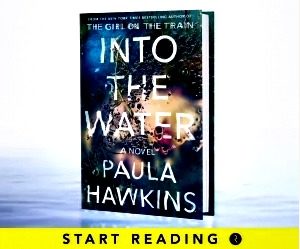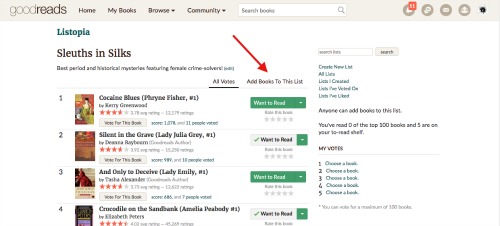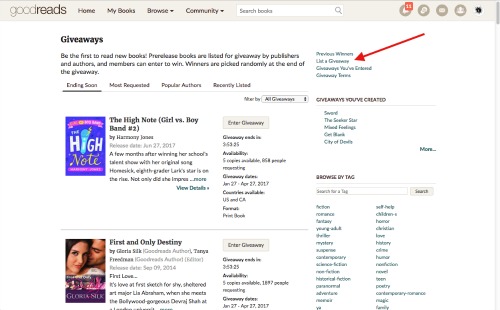Expand your audience exponentially with smart Goodreads marketing
Our guest blogger on smart Goodreads marketing is Kate Sullivan, a professional book designer, editor, and the web editor of TCK Publishing, an independent press dedicated to helping writers make the most out of their author careers. I’m a fan of TCK’s podcast for authors, “The Publishing Profits Podcast Show,” too.
Expand your audience exponentially with smart Goodreads marketing
By now, most of us book people are familiar with Goodreads. It’s an amazing place to keep track of what you’re reading, what you want to read next, and everything to do with the bookish life. And since most authors are also avid readers, we tend to have our digital bookshelves well stocked and we regularly update our reading progress, reviews, and more.
Many of us also have our author profiles set up and have our Facebook and Twitter accounts linked to Goodreads. Heck, maybe you’ve even synced your blog to your Goodreads author page through RSS.
These are all fantastic ways to start leveraging the power of Goodreads’ massive audience to promote your books—but there’s more you can do to take advantage of all those eager readers just looking for the next great book to read.
Let’s look at a few ways—some free and some paid—to connect with the 55 million Goodreads members who might just love your book.
Goodreads ads
Like most free services, Goodreads relies on ads to make money. It offers a wonderful self-service ad platform for authors that can be a very affordable way to reach tens of thousands of readers who are interested in your precise genre.
Goodreads ads work much like Facebook ads or Google Adwords campaigns in that you create a campaign, assign it a budget, and choose a timeframe for it to run. Where it can be more effective than a Facebook or Google campaign, though, is that Goodreads lets you target specific groups of readers, like those who are interested in both YA and science fiction.
We all know that targeting very specific niches pays off when marketing your book. Well, you can’t get much more specific than aiming at avid readers who specifically love the genre you’re writing in. While you can get very targeted demographics using other ad platforms, you’ve going to pay a lot more for that level of specificity . . . plus, you’re never quite sure if the people you’re targeting are avid readers who are likely to buy a new book. On Goodreads, you know your audience loves to read and is probably actively looking for a new book. You’ve got a leg up.
Creating an effective Goodreads ad
 The best Goodreads ads include a direct and specific call to action, like “Dive into this thrilling high-tech murder mystery today.” Don’t be shy—tell your audience exactly what you want them to do and what they can expect from your book.
The best Goodreads ads include a direct and specific call to action, like “Dive into this thrilling high-tech murder mystery today.” Don’t be shy—tell your audience exactly what you want them to do and what they can expect from your book.
Be sure to include a preview link so that you can hook potential readers—samples really do sell books.
Link your ad to somewhere readers can buy your book easily. While it’s sometimes tempting to link to your author website, if potential buyers have to hunt around to figure out how to buy your book, they’re likely to give up. Make it easy when choosing your URL—send them directly to a sale page or your Amazon listing.
Test different ads. Within a single Goodreads ad campaign, you can create different ads. This lets you test engagement: Are more people clicking on the ad that describes your book as a romantic horror novel, or the one that calls it a character-driven supernatural thriller?
Advantages and disadvantages
Goodreads ads have a relatively low click-through rate—the company states it’s somewhere around 0.05% on average—but this doesn’t mean these ads aren’t effective. That’s because while only five out of 10,000 people might click on your ad, those people are primed to want to buy a book.
Plus, the ad rates are very low compared to similarly targeted Google and Facebook ads—they cost only 50 cents per click and you can get lots of data about who’s viewing your ad, clicking on it, and adding your book to their shelves.
Even if you don’t sell a book from the campaign, for $25 or less, you can get a good amount of information about who’s interested in your book . . . which can help you with your overall marketing strategy by letting you get more focused on the people who really want what you’re writing.
Listopia
A fantastic, free way to promote your book on Goodreads is to add it to lists.
Goodreads Listopia is a huge wonderland of lists made by users. Topics range from standard “best of” lists to very specific niches like “Amazing Christian fantasy series that I wish everyone knew about” and “Sleuths in Silks” (a list of historical detective novels with female main characters).
Lists can help your books gain a lot of visibility, which can lead to purchases and reviews, escalating your momentum.
That’s because Goodreads lists aren’t just static groupings of books; users can vote on lists by clicking on the list, then clicking “Vote on this List” in the column of actions at the right. This brings up a screen that lets you put your top five books from the list in order.
From that same screen, you can add books to the list—and this is where lists become incredibly useful for promoting your own work.
If you find a list that’s relevant to your niche, you can add your book and vote for it within the list. Then, other users who are exploring the same list will see your book grouped with the others on the list—which will often be books by famous authors or popular favorites that people are searching for.
This exposure can help get people to click on your book to learn what it’s about—without paying for ads.
Tips and tricks for lists
Be polite when you’re using Goodreads lists to promote your work—it’s never a good idea to spam, and adding your books to a hundred different lists without ever adding works by other authors or creating your own independent lists is just rude.
Instead of adding your book to 20 lists at a time, consider adding it to a new, relevant list maybe once a week. And in between adds, vote and comment on other lists without promoting. (EDITOR’S NOTE 5-21-17: Several readers have commented that you can no longer add your book to lists — others have to do it for you.)
You can also create your own lists of books you’ve enjoyed and want to promote, including one of your own titles. Again, less is more here—people aren’t going to want to read and interact with a list that’s just your own books, which means you’re not getting the kind of engagement that makes Goodreads valuable.
Consider getting together with a few other authors in your genre to create lists of recommendations that include all of your group’s books and others that you enjoy or that have inspired you. This works way better than purely self-promotional lists.
Giveaways
The single best promotional tool on Goodreads is the giveaway for print books. It’s not quite free—you’ll need to provide the books to the winners—but it’s very low-cost and incredibly effective.
Creating a giveaway couldn’t be simpler. Just go to Browse > Giveaways and then click on “List a Giveaway” in the actions column at right. You’ll be taken to a page where you can list all the necessary information, including teaser text/description, number of copies, allowed locations, and genre categories.
Goodreads staff will read your listing and then email you when it’s approved; this usually only takes a day or two.
When your giveaway is live, it’ll be listed on the main giveaways page where users can either stumble upon it or find it when they’re looking specifically for books in your genre.
Goodreads does something great with its giveaways—it encourages readers to add the book to their “Want To Read” list when they enter. An average giveaway that lasts 30 days can get more than 750 “shelf adds” this way . . . and while that doesn’t necessarily translate to sales, it increases your exposure exponentially in a couple of ways.
First, users who’ve added your book to their shelf will see it again when combing through their books. Even if they don’t win a copy, they may decide to pick it up the next time they’re deciding what to read—after all, something about your book engaged them enough to want to win a copy.
Next, adding a book to a shelf is an “activity” on Goodreads, and activities are displayed in a user’s Activity Feed. This shows up on their Goodreads page and in their friends’ feeds—and if the user has connected Goodreads to Facebook or Twitter, that activity also gets posted over there. So a user who adds your giveaway book to their shelf is automatically sharing your book to their social networks and followers. Pretty great, right?
Fulfilling a Goodreads giveaway is easy. Goodreads does all the hard work of keeping track of entries and choosing the winners. When your pre-determined giveaway duration is up, you’ll get an email with the names and addresses of the winners. All you have to do is mail out the books.
How to run a great giveaway
Be sure to give people enough time to find your giveaway. A full month is usually a good length—you may not see much activity at first, but as the month draws to a close, you’ll start getting a lot more “shelf adds” because your book comes up toward the top of the “ending soon” display on the site.
Set reasonable criteria. Print books can be expensive, and shipping them can be even more so. If you’re in the US, consider limiting your giveaway to the US and maybe Canada to ensure that you can afford to ship the copies out. And offer a reasonable number of giveaway copies—three to five is enough to encourage people to enter because they’ll have a good chance of winning, but not so many that you’ll be spending a fortune on print books or hours upon hours shipping them out.
Promote the giveaway to your own followers. Add the Goodreads Giveaway Widget to your blog and let your email list know that you’re doing a giveaway. While your followers are already fans of your work and not new contacts, remember that every time someone with a public Activity Feed adds your book to a shelf, all their followers see it. It’s like automated word of mouth.
Ship to the winners promptly—and include some extras. If you have promotional bookmarks or postcards, include a few in the package. Add some goodies relating to another book you’ve written to cross-promote. Include a letter to the winner thanking them for participating, giving them your website address, and asking them to consider signing up for your email newsletter. Be sure to ask them to review the book on both Goodreads and Amazon when they’ve read it—reviews help sell books.
Connect with other authors to cross-promote each other’s books in your giveaways. You can include bookmarks, buttons, or other swag in your packages going out, increasing your exposure and helping each other gain new fans.
Digital options
Because the print giveaway program has been so popular, Goodreads introduced a Kindle giveaway program in 2016.
While the program is in beta, only authors who are published through Amazon’s traditional publishing arm, Amazon Publishing, can participate. However, Goodreads has stated several times that it will roll out the option to other authors, including those who use the KDP platform. We don’t know when that will be, but it’s worth keeping an eye on.
More than just a great resource for organizing your “to read” list, Goodreads is an invaluable tool for writers looking to expand their reach and grow their audience. From low-cost paid ads to free and effective giveaways, Goodreads has marketing options for every budget and skill level. Smart Goodreads marketing options are available to everyone, so take advantage of them.
Editor’s note: Goodreads is very different from other social platforms, so you want to learn how to use it effectively for book marketing before jumping in with both feet. The best way to do that is to first use it as a reader before using it for book marketing. For more on Goodreads, read “3 mistakes you’re making on Goodreads” and “3 cool things you can do as a Goodreads author.” We also offer a popular audio training program,”How to Promote Your Book with Goodreads” featuring advice from a Goodreads staffer.
Like what you’re reading? Get it delivered to your inbox every week by subscribing to the free Build Book Buzz newsletter. You’ll also get my free “Top 5 Free Book Promotion Resources” cheat sheet immediately!





Hi Kate You and I think the same as I very well could have written this article! All the tiny details…Yep. All there; however, I am a fella that cuts it to the bare bones and elect to pay ten to twenty cents for a click. They run close to 100,000 ads a day and it usually runs around a dollar or so. That is a lot of exposer for a buck. Great article and now …I am an adoring fan! One more thing…I now run the ads strictly during a price promotion for better results.
Over 90 books in print and Kindle Amazon.
I really do think it’s a better use of ad funds than appealing to the huge audience on Google or even Facebook! You know you’re getting in front of READERS. Your idea of running the ads strictly when you’re also running a price promotion is a great one – and will help amplify your results both in terms of CTR and boosting your Amazon rank. Nice work!
/Kate
Great article! I’ve been a reader longer than I’ve been a serious writer, and I have some honest reviews up there that are less than three stars. For good social karma, should I take those negative reviews down, or set up a separate author account and only post good reviews of other authors’ work?
Honestly, I would leave them up. Social proof is everything – and if you’re being completely honest about why you didn’t like a book, you’re doing other readers a favor!
Personally, I think that as long as you’re not being hurtful, it’s a service to authors and readers alike to give honest, thoughtful reviews…even the critical ones. Not everyone will like every book, and as authors, we need to learn to live with that. And we can never improve without constructive criticism!
Now, if EVERY review you write is less than 3 stars, that’s a problem, but if it’s just one or two books that really didn’t work for you? I think you’re good to go.
I was unaware of the blog sync feature on Goodreads. As soon as I leave here, I’ll check it out.
Thanks as well for mentioning the 50¢ click-through cost, Kate. I thought Google offered cheaper options, but I haven’t used them for years. Time to reinvestigate.
Done. As with many Goodreads features, however, the process isn’t intuitive.
I had to begin as though I were starting a new blog and proceed from there. After syncing, I received the following error: “Problems with this feed entry would prevent it from being imported: This post has already been imported. You might try using a different feed format if one is available.”
I ignored the error, and the feed now shows on my author profile.
Good to know about that error! I’ve not experienced that before, but I wonder if it’s mostly a “cover your @ss” measure in case some aspect of the feed doesn’t strictly meet their specifications.
Google DOES have a great many ads that cost less than Goodreads per click…but I find, anecdotally, that the conversion rate from Goodreads is higher. Therefore, you might be paying more per click, but your odds of actually getting a result from those clicks is higher. It balances out.
Excellent article, thanks! I’m considering the best way to promote a new upcoming title and this gives me a lot to think about.
Definitely look at Goodreads! In combination with your own email newsletter, Amazon promotion techniques, and especially giveaways, you can leverage the built-in enthusiastic reader audience there to really amplify your results for a launch.
Kate, In my recent experience on Goodreads with Listopia, one is not able to add one’s own books to a list, but must wait for another reader to add it, or perhaps get a fellow reader to list it. Are you suggesting that if you buy Goodreads ads this becomes possible? Are you sure your information is current? I’m told the rule used to be as you describe. If one can add your own books, will you please let us know how? Thanks! Peter
I agree with Peter. Authors are no longer able to add their own books to Listopia. That functionality has been gone for at least a year. I’ve actually had an ARC reader add a couple of my books. Once they’re there, I can vote them up but that’s all I can do.
Well, drat! Shows when the last time I tried to add a book of my own was – I typically add others’.
This might be a good time to rely on a writers’ group or promotion support group – writers can band together to add each others’ books to relevant lists (as long as you do it considerately, without spamming!)
Goodread’s Ads underperform for most people, but well-written article.
Thanks!
As with everything, your results may vary….I find that certain types of books and certain approaches do better with certain marketing strategies or venues. It’s far from an exact science, and it takes a lot of experimentation to find the formula that works for you.
But I always like to share different techniques, methods, tools, etc. – the way to find that working custom formula is to build a heck of a big, flexible toolkit!
I’ve tried most of these without much success. I still love Goodreads because I’m an avid reader and enjoy participating in some of the discussions. I’ve been a wee bit remiss about the latter lately…new book coming out soon.
Good summary though. The more we do on social media, the better people know us. Takes time from writing, but social media can also be fun.
r/Steve
One of the hardest things to track is, of course, the ROI from participating on social media! It doesn’t necessarily translate into immediate sales, so it can be hard to justify…but the goodwill you get from interacting with fans on Twitter, Goodreads, and beyond does end up yielding results. Plus, it never hurts to get out and be seen…folks DO click on each others’ profiles on Goodreads and could discover your work just from a post you leave in a discussion!
Hi Kate,
Just so you know, I was trying to add my books to Listopia, and Goodreads has changed their policy. You can no longer add your own book to the lists. But, you can certainly get a friend to do it for you. 🙂
VERY good to know! And yet another reason why we need to build author support groups for ourselves to help amplify each others’ marketing efforts while staying sane as indie writers!
I totally agree. I’ve learned so much just by reading what others have done and experienced!! Thank you for all you’ve shared.
Kate, thanks for a helpful article! It triggered the discussion here that brings us all up-to-date. Good ideas. Now if I could only figure out how to get my revised, updated editions of my books included under my author name, I could actually try out some of your suggestions! Because the titles haven’t changed, Goodreads seems insistent on sticking to the original editions –which are all O.P. (sigh)
Gail, that would make me nuts. Have you called them about it?
Sandy
Thanks, Sandy! I haven’t known WHAT to do!! And yes, it’s driving me nuts, LOL. I’ll try calling them!
So glad to know what to do with Goodreads. They gave my book a good review and I haven’t known what to do with them next.
I’m glad your book has received good reviews there, Linda.
Sandy